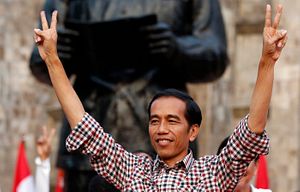Early counting today suggested that former furniture salesman and governor of Jakarta Joko Widodo has won Indonesia’s presidential election; however, analysts said there were widespread fears the final vote could be rigged against him.
Exit polls, which are considered a reliable take on the final result, show Widodo holding a lead of about 52.5 percent of the vote. His rival former general Prabowo Subianto was on about 47.5 percent.
Widodo claimed victory, telling reporters: “We are thankful that according to the quick count announcements, until now, they show that Jokowi-JK at this moment in the count have won.” “JK” refers to Jufuf Kalla, his running mate.
Prabowo has refused to concede defeat.
“While the quick counts are usually reliable there remains the possibility of vote manipulation over the next two weeks before the official result is announced,” Jakarta-based Concord Security analyst Keith Loveard said.
“There are widespread fears that the vote will be ‘fixed’ to ensure a Prabowo victory,”
He said activist journalist Allan Nairn had reported that the Special Forces (Kopassus) – which Prabowo once led – and the State Intelligence Agency were mounting an operation to make sure that the former general wins.
“Given the enthusiasm that has met the quick count results from Widodo’s camp, if that happens, there could be a very aggressive response from his grassroots supporters,” Loveard said.
More than 180 million people were expected to vote in the poll.
Widodo, known affectionately as Jokowi, had been an overwhelming favorite in the early stages of campaigning but he faced a stiff challenge from Prabowo, a political darling of the military and the establishment that once backed the former dictator Suharto.
Prabowo has also been accused of a string of human rights abuses.
Assuming a transition in power goes smoothly, Natalie Sambhi, an analyst with the Australian Strategic Policy Institute, said Widodo would need some time to ease into the international aspects of his role.
“But he has surrounded himself with a highly capable and well respected foreign policy team. Australia can expect a willingness on Jokowi’s behalf to work together on a range of issues, but diplomatic shocks like further Snowden revelations could complicate that,” she said.
Her sentiments were backed by Greg Barton, senior advisor at the Australia-Indonesia Centre and a senior academic with Monash University in Melbourne. He spent much off the day traveling between polling booths and said “it was a pretty calm and happy voting day.”
He said a five percent margin would ensure Widodo’s independence within the party the backed him – the Democratic Party of Struggle (PDI-P) – where factional interests have provided their own political headaches, and provide a big enough buffer to keep the military confined to barracks.
“There have been some concerns for sometime about manipulations,” Barton said. “But it looks like a comfortable win. This is enough of a buffer to feel comfortable with and give Jokowi a bit more of a mandate.”
Fears that Prabowo might try to destabilize a Widodo government were also raised by Gavin Greenwood, a security analyst with Hong Kong-based Allan & Associates who said this could take the form of heightened tension in the peripheries.
“Aceh and perhaps Kalimantan are potential regional areas where seemingly unexplained increased inter-communal, political or even criminal violence could occur – in order to undermine the administration’s mandate and competence.”
He also said the military’s response should also be closely monitored.
“Not least because the army had been singled out for greater investment in the event of a Prabowo victory. The armed forces have withdrawn from their past overt influence in national politics, but still retain considerable leverage at various political and economic levels and can make their opposition to policies that run counter to the military leadership’s interests felt through dissent.”
Loveard also added that Widodo still had battles to face even with a clear victory.
“The coalition ranged against him will have a majority in the parliament, which only on Tuesday also voted to choose its leader by a vote, rather than automatically allow the position to go to the party that won the most votes in the legislative poll – PDI-P.
“While Widodo managed to rule Jakarta without a majority in the local assembly, he will find it much harder to do so at the national level, where there are many vested interests who will not want to see him try to clean up Indonesia,” Loveard said.
Luke Hunt can be followed on Twitter @lukeanthonyhunt

































